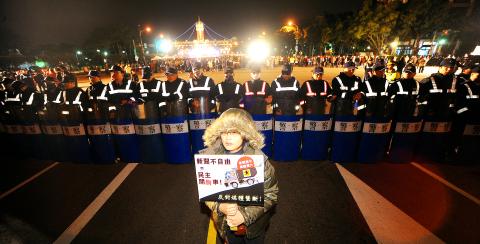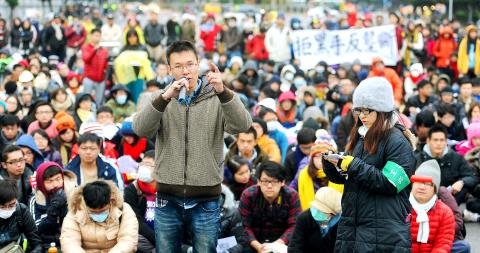Hundreds of university students voiced their disappointment and anger over President Ma Ying-jeou’s (馬英九) continued silence over their anti-media monopoly appeal following an overnight vigil yesterday and vowed to keep on pressing the president for a response and action on an issue that risks undermining freedom of speech in the nation.
The students launched the protest on 7pm on Monday at Liberty Square, followed by a sit-in protest starting at 4am yesterday on Ketagalan Boulevard, right outside the restricted area for the New Year’s Day flag-raising ceremony. They demanded that the president clarify his position on the controversial Next Media Group (壹傳媒集團) deal and address related issues on media monopoly and Chinese influence over Taiwan’s media.
However, Ma did not say a single word about the students’ concern about media monopoly in his New Year’s Day address.

Photo: Liu Hsin-de, Taipei Times
In their fifth protest over the media deal since July, the students braved the cold, with temperatures hovering around 10°C, and took turns making speeches about how the deal could jeopardize media diversity and, for the first time, listed their concern over growing Chinese influence on Taiwan’s media as a primary cause of the protest.
Sitting in front of hundreds of police equipped with riot shields, the crowd chanted slogans, such as “Anti-media monopoly,” “Ma Ying-jeou, declare your position” and “Anti-Beijing interference” before concluding the protest at 8:30am.
Lin Fei-fan (林飛帆), leader of the Youth Alliance Against Media Monsters, the organizer of the protests, announced five demands: that Ma should pledge that he is against media monopoly and initiate concrete measures to stem rising Chinese influence; that the Chinese Nationalist Party (KMT) should not block amendments to media regulatory bills; that Fair Trade Commission should hold a legally binding public hearing; that the Investment Commission should clarify whether the consortium applying to purchase the Next Media Group should be considered foreign investors; and that the government should disclose all information about the deal and ensure transparency.

Photo: Liu Hsin-de, Taipei Times
“If the government fails to make substantial progress [on these issues], we will keep coming back,” Lin said.
The students have received strong support from university professors and civic groups. More than 600 professors across the country had signed a petition in support of their cause and several professors attended the protests and spoke with the students. National Taiwan University professor Chang Chin-hwa (張錦華) condemned what he called Ma’s silence on the issue and refusal to listen to the people, while Academia Sinica researcher Wu Ruei-ren (吳叡人) said: “Ma has to choose between the good and the evil, and he will be ultimately judged by Taiwanese and history.”
Prior to the sit-in, the students gathered at Liberty Square for a night rally, which was filled with songs and speeches. They staged their own year-end countdown, to the tune of The Final Countdown, a 1980s hit by the rock band Europe, to rival the countdown party at Taipei’s Xinyi District (信義).
In related news, Taiwanese singer-songwriter Deserts Chang (張懸) praised Wu Ching-feng (吳青峰), the lead singer of the popular band Sodagreen (蘇打綠), in a Facebook post, after the latter voiced his opposition to media monopoly on stage during his New Year’s Eve live performance at the E-da World theme park in Greater Kaohsiung.
However, Wu’s remarks were removed from the rerun aired by China Television Co, a television channel owned by pro-China Want Want China Times Group (旺旺中時集團), which was in charge of broadcasting the festivities.
“He [Wu] has always managed to achieve things that I couldn’t do or do well enough. I’m truly grateful for his ability to cleverly manage fame and to transform fame into a power that prevents him from being manipulated,” Chang wrote.
AdditIonal reporting by Lin Shu-hui

TRAGEDY STRIKES TAIPEI: The suspect died after falling off a building after he threw smoke grenades into Taipei Main Station and went on a killing spree in Zhongshan A 27-year-old suspect allegedly threw smoke grenades in Taipei Main Station and then proceeded to Zhongshan MRT Station in a random killing spree that resulted in the death of the suspect and two other civilians, and seven injured, including one in critical condition, as of press time last night. The suspect, identified as a man surnamed Chang Wen (張文), allegedly began the attack at Taipei Main Station, the Taipei Fire Department said, adding that it received a report at 5:24pm that smoke grenades had been thrown in the station. One man in his 50s was rushed to hospital after a cardiac arrest

SAFETY FIRST: Double the number of police were deployed at the Taipei Marathon, while other cities released plans to bolster public event safety Authorities across Taiwan have stepped up security measures ahead of Christmas and New Year events, following a knife and smoke bomb attack in Taipei on Friday that left four people dead and 11 injured. In a bid to prevent potential copycat incidents, police deployments have been expanded for large gatherings, transport hubs, and other crowded public spaces, according to official statements from police and city authorities. Taipei Mayor Chiang Wan-an (蔣萬安) said the city has “comprehensively raised security readiness” in crowded areas, increased police deployments with armed officers, and intensified patrols during weekends and nighttime hours. For large-scale events, security checkpoints and explosives

PUBLIC SAFETY: The premier said that security would be tightened in transport hubs, while President Lai commended the public for their bravery The government is to deploy more police, including rapid response units, in crowded public areas to ensure a swift response to any threats, President William Lai (賴清德) said yesterday after a knife attack killed three people and injured 11 in Taipei the previous day. Lai made the remarks following a briefing by the National Police Agency on the progress of the investigation, saying that the attack underscored the importance of cooperation in public security between the central and local governments. The attack unfolded in the early evening on Friday around Taipei Main Station’s M7 exit and later near the Taipei MRT’s Zhongshan

ON ALERT: Taiwan’s partners would issue warnings if China attempted to use Interpol to target Taiwanese, and the global body has mechanisms to prevent it, an official said China has stationed two to four people specializing in Taiwan affairs at its embassies in several democratic countries to monitor and harass Taiwanese, actions that the host nations would not tolerate, National Security Bureau (NSB) Director-General Tsai Ming-yen (蔡明彥) said yesterday. Tsai made the comments at a meeting of the legislature’s Foreign Affairs and National Defense Committee, which asked him and Minister of National Defense Wellington Koo (顧立雄) to report on potential conflicts in the Taiwan Strait and military preparedness. Democratic Progressive Party (DPP) Legislator Michelle Lin (林楚茵) expressed concern that Beijing has posted personnel from China’s Taiwan Affairs Office to its